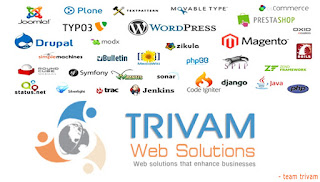CONTENT MANAGEMENT SYSTEM (CMS)
The definition of a CMS is an application (web-based), that provides capabilities for multiple users with different permission levels to manage (all or a section of) content, data or information of a website project, or intranet application.
Managing content refers to creating, editing, archiving, publishing, collaborating on, reporting, distributing website content, data and information.
A content management system (CMS) is a software application or set of related programs that are used to create and manage digital content. CMS are typically used for enterprise content management (ECM) and web content management (WCM). An ECM facilitates collaboration in the workplace by integrating document management, digital asset management and records retention functionalities, and providing end users with role-based access to the organization's digital assets. A WCM facilitates collaborative authoring for websites. ECM software often includes a WCM publishing functionality, but ECM web pages typically remain behind the organization's firewall. Both Enterprise Content Management and Web Content Management Systems have two components:
A content management application (CMA) and a content delivery application (CDA). The CMA is a graphical user interface (GUI) that allows the user to control the design, creation, modification and removal of content from a website without needing to know anything about HTML. The CDA component provides the back-end services that support management and delivery of the content once it has been created in the CMA.
Features of CMS:
Features can vary amongst the various CMS offerings, but the core functions are often considered to be indexing, search and retrieval, format management, revision control and publishing.
A CMS may also provide tools for one-to-one marketing. One-to-one marketing is the ability of a website to tailor its content and advertising to a user's specific characteristics using information provided by the user or gathered by the site -- for instance, a particular user's page sequence pattern. For example, if the user visited a search engine and searched for digital camera, the advertising banners would feature businesses that sell digital cameras instead of businesses that sell garden products.Other popular features of CMSes include: SEO-friendly URLs Integrated and online help, including discussion boards Group-based permission systems Full template support and customizable templates Easy wizard-based install and versioning procedures Admin panel with multiple language support Content hierarchy with unlimited depth and size Minimal server requirements Integrated file managers Integrated audit logsA list of few CMS packages:
· Drupal
· Joomla
· Magento
· ModeX
· Opencart
· PivotX
· Prestashop
· WordpressThe following are some of the must-have ECMS features we recommend:
Easy Administration
Powerful Publishing Tools
Built-in SEO Tools
Social Media Integration
Detailed Analytics
Simple Workflow and Publishing Controls
Security
Multi-Platform Capabilities Exemplary Support
Tiered Permissions
Robust Content Templates
Microdata Support for Voice Search
Comprehensive Search
Versioning for Quick Rollback
Business AlignmentChoosing a CMS:
There is almost no limit to the factors that must be considered before an organization decides to invest in a CMS. There are a few basic functionalities to always look for, such as an easy-to-use editor interface and intelligent search capabilities. However, for some organizations, the software they use depends on certain requirements.
For example, consider the organization's size and geographic dispersion. The CMS administrator must know how many people will be utilizing the application, whether the CMS will require multi-language support and what size support team will be needed to maintain operations. It's also important to consider the level of control both administrators and end users will have when using the CMS. The diversity of the electronic data forms used within an organization must also be considered. All types of digital content should be indexed easily.
A content management system, often abbreviated as CMS, is software that helps users create, manage, and modify content on a website without the need for specialized technical knowledge.
In simpler language, a content management system is a tool that helps you build a website without needing to write all the code from scratch (or even know how to code at all).Instead of building your own system for creating web pages, storing images, and other functions, the content management system handles all that basic infrastructure stuff for you so that you can focus on more forward-facing parts of your website.



Techversol’s CMS Development Company empowers businesses with flexible, scalable, and easy-to-manage website solutions.
ReplyDelete